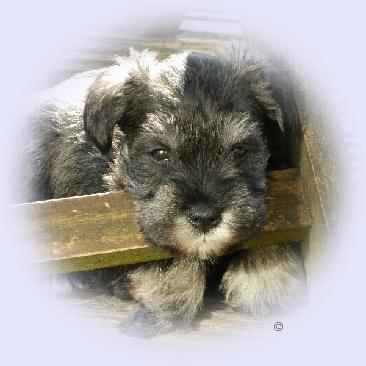
Puppy School
House Training
House Training
House training is a stage which must be worked through with every new puppy. Some pick the idea up very quickly; others seem to take a while to catch on. If your pup is one of the slower ones, take heart - they all get there in the end.

Understanding how your puppyís mind works can help to take some of the hassle out of housetraining for both of you. Remember, what being clean means to you and what it means to your pup is not necessarily the same thing. To you, it may be important that your puppy will go to a chosen spot in the garden to do their business. To your pup, it is important to relieve themselves where and when the notion takes them. The puppyís only major criteria are that they would prefer to perform in a quiet place away from their food and their bed, which is a health and safety rule of nature.
From your puppyís point of view, this makes behind the sofa or on your bedroom floor perfectly acceptable places. It is up to you to show them that this is not what you had in mind, and to guide them to a better spot.
So letís get everybody on the same wavelength and make house training as easy as possible for both of you. Right from the start, choose a spot in the garden which you would like your puppy to use as their toilet area. Remember that a puppyís early warning system is not very good in the early weeks so make life as easy as possible for both of you by choosing a spot which is quick and easy to reach from their bed, food and play areas.
Anticipate when the puppy will need to be taken out
As a general rule, puppies need to go to the loo at the following times. Immediately after waking, after eating or drinking, when excited, after playing and sometimes during a wild game if they did not have a chance to go out before the game started, and at least every waking hour.
These are your guidelines, get your pup to their appointed toilet area at these times and you are well on your way to cracking this.
These are your guidelines, get your pup to their appointed toilet area at these times and you are well on your way to cracking this.
Watch for the signs
Learn to read your puppyís body language and you will soon spot tell tale signs that he is about to urinate or defecate. Typical signs to look for are sniffing around in a purposeful manner, circling round on one spot or holding the tail high. As soon as you spot these signs, pick the pup up and take him straight to his toilet area.
Show him what you expect of him
Donít expect your puppy to know where he has to go without being shown. Take him, stay with him, encourage him (start using a chosen word now and in time, he will learn to go on command), and praise him every time he gets it right!
Donít let it turn into a game
House training time is not wild game in the garden time. If the puppy does not perform straight away when taken to his toilet area, donít keep him out for ages. Instead, take him back inside but watch him especially carefully. Donít let him wander off behind a chair or into another room. If you have an indoor kennel, pop the pup inside for a few minutes. Take him out again 10 minutes later. This vigilance will quickly bring rewards, so persevere.
Do not expect a very young puppy to last all night without needing the toilet or if you have to go out for a few hours, even after he has got the hang of daytime house training. Some puppies are unable to last all night until they are almost a year old. Provide the puppy with a suitable surface that is easy to clean. Cover the appointed area with polythene under a layer of newspaper. The paper is quick and easy to dispose of and the polythene will protect your floor. A relatively enclosed night time bed area will speed up the house training process, but do make sure as your puppy grows that he still has enough space to avoid soiling his own bed if he cannot wait - a prospect neither of you will relish.
Never chastise a puppy for having an accident - he can not wait and it is unfair to expect him to hold on until you are ready to take him out. Punishment will only confuse him and may in fact teach him to be more secretive about toileting. You donít want him to be afraid of going to the loo where you can see him, but rather to perform quickly in your presence when you take him out!
Mistakes will happen; itís all part of bringing up a puppy. Instead of getting annoyed with the pup or yourself, clean up any accidents which happen as quickly as possible, with the minimum of fuss. Treat the area with a pet deodoriser. Such a spray will completely eliminate doggy odours detectable by his sensitive nose as well as yours. To our noses an area may smell perfectly fresh when cleaned with a normal cleaner, but to the dogís nose there will be a residual scent which attracts him back to use the same area again.
Learn to read your puppyís body language and you will soon spot tell tale signs that he is about to urinate or defecate. Typical signs to look for are sniffing around in a purposeful manner, circling round on one spot or holding the tail high. As soon as you spot these signs, pick the pup up and take him straight to his toilet area.
Show him what you expect of him
Donít expect your puppy to know where he has to go without being shown. Take him, stay with him, encourage him (start using a chosen word now and in time, he will learn to go on command), and praise him every time he gets it right!
Donít let it turn into a game
House training time is not wild game in the garden time. If the puppy does not perform straight away when taken to his toilet area, donít keep him out for ages. Instead, take him back inside but watch him especially carefully. Donít let him wander off behind a chair or into another room. If you have an indoor kennel, pop the pup inside for a few minutes. Take him out again 10 minutes later. This vigilance will quickly bring rewards, so persevere.
Do not expect a very young puppy to last all night without needing the toilet or if you have to go out for a few hours, even after he has got the hang of daytime house training. Some puppies are unable to last all night until they are almost a year old. Provide the puppy with a suitable surface that is easy to clean. Cover the appointed area with polythene under a layer of newspaper. The paper is quick and easy to dispose of and the polythene will protect your floor. A relatively enclosed night time bed area will speed up the house training process, but do make sure as your puppy grows that he still has enough space to avoid soiling his own bed if he cannot wait - a prospect neither of you will relish.
Never chastise a puppy for having an accident - he can not wait and it is unfair to expect him to hold on until you are ready to take him out. Punishment will only confuse him and may in fact teach him to be more secretive about toileting. You donít want him to be afraid of going to the loo where you can see him, but rather to perform quickly in your presence when you take him out!
Mistakes will happen; itís all part of bringing up a puppy. Instead of getting annoyed with the pup or yourself, clean up any accidents which happen as quickly as possible, with the minimum of fuss. Treat the area with a pet deodoriser. Such a spray will completely eliminate doggy odours detectable by his sensitive nose as well as yours. To our noses an area may smell perfectly fresh when cleaned with a normal cleaner, but to the dogís nose there will be a residual scent which attracts him back to use the same area again.
If the puppy is having a lot of accidents, this would suggest that he does not really understand what is expected, so take the time to go right back to the beginning and show him again what you want. No shouting or smacking, just lots of time and patience!
It is quite common for a puppy to appear to have become house trained and then to relapse for a while. Do not despair; consider the possibilities and you will probably be able to pinpoint what has gone wrong. From there, take a few steps back and retrain.
It is quite common for a puppy to appear to have become house trained and then to relapse for a while. Do not despair; consider the possibilities and you will probably be able to pinpoint what has gone wrong. From there, take a few steps back and retrain.